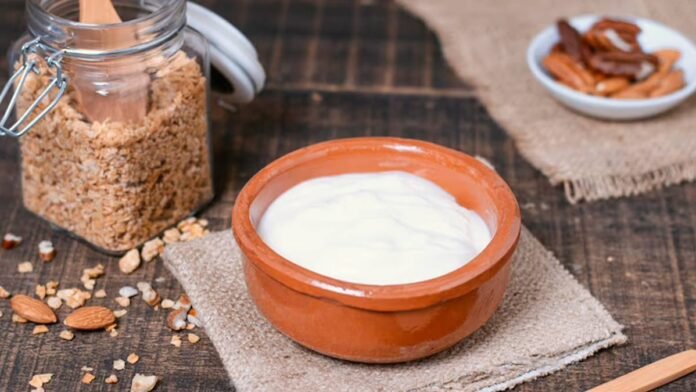Indulging in a daily dose of curd, also known as yogurt, during the winter months can offer a myriad of health benefits. Beyond being a tasty addition to your meals, curd is a versatile dairy product that can positively impact various aspects of your well-being. Here’s a closer look at what happens to your body when you make curd a regular part of your winter diet.
- Boosts Immunity: Curd is a rich source of probiotics, often containing live beneficial bacteria that support gut health. During winter, when the immune system may face challenges, the probiotics in curd contribute to a healthy gut microbiota. A robust gut microbiome is linked to improved immunity, helping your body fend off common winter ailments like colds and flu.
- Enhances Digestion: Probiotics in curd aid digestion by promoting the balance of good bacteria in the gut. This can be particularly beneficial during winter when digestive issues might arise due to changes in dietary patterns. Consuming curd regularly may alleviate common digestive discomforts and contribute to a smoother digestive process.
- Provides Essential Nutrients: Curd is a nutritional powerhouse, offering essential nutrients such as calcium, vitamin D, and protein. These nutrients are vital for maintaining bone health, especially when exposure to sunlight (a natural source of vitamin D) might be limited during the winter months. Adequate calcium and vitamin D intake are crucial for overall well-being.
- Regulates Body Temperature: In Ayurveda, curd is often recommended to balance the body’s internal temperature. During winter, when external temperatures drop, consuming curd can help regulate your body’s internal heat. This may contribute to a feeling of warmth and comfort, making it a delightful addition to your winter diet.
- Supports Weight Management: Including curd in your daily diet may aid in weight management. The protein content in curd helps induce a feeling of fullness, reducing the likelihood of overeating. Additionally, the probiotics in curd may positively influence the gut-brain axis, potentially impacting food choices and metabolism.
- Maintains Skin Health: Curd contains lactic acid, which is known for its exfoliating properties. Regular consumption of curd may contribute to healthier skin by promoting a natural glow and helping to address issues like dryness. The combination of nutrients in curd, including vitamins and antioxidants, can benefit the skin from within.
- Manages Blood Pressure: The potassium content in curd makes it a heart-friendly food. Potassium helps regulate blood pressure by balancing sodium levels in the body. Including curd in your diet may contribute to cardiovascular health, an important consideration during the winter season.
- Provides Energy: Curd is a great energy booster, thanks to its combination of proteins and carbohydrates. Including curd in your breakfast or snacks can provide a sustained release of energy throughout the day, helping you stay active and alert during the colder months.
- Improves Mood and Mental Health: Beyond its physical health benefits, curd may also have a positive impact on mental well-being. Some studies suggest a potential link between the consumption of probiotics, found in abundance in curd, and improved mood. The gut-brain connection is a fascinating area of research, and a healthy gut is increasingly recognized as a contributor to mental health. Including curd in your winter diet might be a simple yet tasty way to support your overall sense of well-being.
- Versatility in Culinary Delights: Curd’s versatility extends beyond being a standalone snack. It can be incorporated into various culinary delights, from creamy raitas and smoothies to desserts and marinades. Its ability to complement both sweet and savory dishes makes it a kitchen staple that adds a delightful touch to your winter meals.
- Supports Bone Health: The calcium and vitamin D content in curd is not only beneficial for digestion but also crucial for maintaining strong and healthy bones. During winter, when outdoor activities may be limited, ensuring an adequate intake of these nutrients becomes particularly important to support overall bone health.
- Hydrates the Body: Curd has a high water content, contributing to hydration. Staying well-hydrated is essential even in colder months when the temptation to drink water might be lower. Consuming curd, which has both hydrating properties and nutritional benefits, becomes a convenient way to keep your body well-nourished and adequately hydrated.
- Caters to Lactose Intolerance: For those who are lactose intolerant, curd can often be a more digestible dairy option. The fermentation process breaks down some of the lactose present in milk, making curd more tolerable for individuals with lactose sensitivity. This makes curd an inclusive choice for a wider range of people.
Unlocking Winter Wellness
Incorporating curd into your daily winter diet goes beyond just satisfying your taste buds; it becomes a holistic approach to wellness. Its nutritional richness, versatility, and potential positive effects on both physical and mental health make it a valuable addition to your seasonal eating habits. As with any dietary changes, individual responses may vary, and it’s advisable to tailor your diet based on your specific health needs and preferences. Enjoy the goodness of curd and let it contribute to a healthier, happier you this winter.
Furthermore, incorporating curd into your daily diet during winter can be a simple yet effective way to enhance your overall health. From supporting immunity and digestion to providing essential nutrients and contributing to skin health, the benefits of regular curd consumption are diverse. As with any dietary change, it’s advisable to consult with a healthcare professional, especially if you have specific health concerns or dietary restrictions. Embrace the goodness of curd this winter for a healthier and more nourished you.

